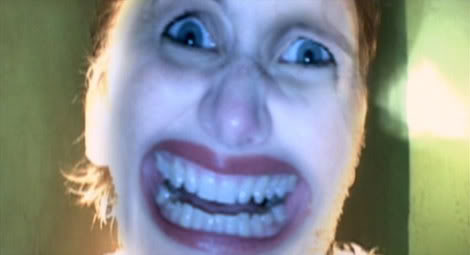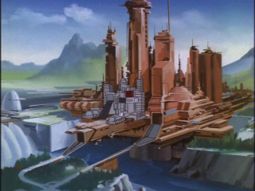Connectivity in Lynch: Michal Ajvaz’s The Other City
[This post originally appeared on my personal blog last year. In light of a new audience, and a new book from Ajvaz forthcoming on Dalkey in a few months, The Golden Age, I’ve reupped it here. Thanks! BB]
The signs of connective tissue in the films of David Lynch are in places very clear. Beyond Lynch’s own mentioning of the mesh of words, most vocally between Mulhollland Drive and INLAND EMPIRE, but also, I would insist, between all the films, in many ways the blank or horrendous spaces that make the films seem the most ‘underneath the viewer’s skin’ are the creation of the space itself, a portal both from film to film, as well as, I must demand, into human.
The rips in spaces in Lynch are all throughout, and in many ways, the definitive space of Lynch: the totem-being behind Winky’s, Club Silencio, the Black Lodge, the pink house on the sound stage and the ‘other version’ of Hollywood & Vine in INLAND EMPIRE, the Rabbits, Ben’s house in Blue Velvet, the exploding shed in Lost Highway, perhaps the entire terrain of Eraserhead, etc., etc. You could list these rooms forever.
You could also list, in your own life, the spaces of your mind that are contained in memory or in associative practice: sleep rooms, childhood slurrings, ruined pictures, unrecorded thoughts, most any second mostly. That you could also not truly make this list is important too, as here is an example, in Lynch’s hands, perhaps, of what occurs in evidence of the reckoning:

[Watch the whole scene here]
Other cities
 If Blake likes a book, you can be relatively sure that it will be decent or, at the very least, cause some sweet internal hemorrhaging. Awhile ago I read with interest something that he posted about this Dalkey book just recently translated into English, The Other City, by Michal Ajvaz. Being a masochist, I eventually picked it up and, with its weird transdimensional runes and strange otherworldly trolleys, hasn’t disappointed. The Prague Ajvaz describes isn’t one you’d recognize from a Fodor’s travel guide, but is definitely truer for all that, I think. I say this having never been to Prague, but it just feels right. Laird Hunt (whose new book Ray of the Star is coming out in September some time), touches on this idea in his last novel, The Exquisite. He writes:
If Blake likes a book, you can be relatively sure that it will be decent or, at the very least, cause some sweet internal hemorrhaging. Awhile ago I read with interest something that he posted about this Dalkey book just recently translated into English, The Other City, by Michal Ajvaz. Being a masochist, I eventually picked it up and, with its weird transdimensional runes and strange otherworldly trolleys, hasn’t disappointed. The Prague Ajvaz describes isn’t one you’d recognize from a Fodor’s travel guide, but is definitely truer for all that, I think. I say this having never been to Prague, but it just feels right. Laird Hunt (whose new book Ray of the Star is coming out in September some time), touches on this idea in his last novel, The Exquisite. He writes:
There are two New Yorks. One of them is the one you go out into every day and every day it smacks you in the face and maybe you laugh a little and the people walk down the street and trucks blow their horns and you are happy or you are not, but your heart is beating. Your heart is beating as you walk, say, through a steady drizzle, your beat-up umbrella bumping other beat-up umbrellas, muttering excuse me, skirting small, dirty puddles and drifts of dark sediment, stepping out of the way of the young woman or young man on a cell phone who didn’t see you coming, didn’t notice you had stepped out of the way, didn’t give a shit, didn’t hear you say, because of this, fuck you, saying fuck you with your heart beating faster, feeling pretty good about saying fuck you, suddenly maybe feeling good about the drizzle, about the brilliant beads of water on the cabs going too fast down Prince, on the delicate ends of the oak branches as you cross Elizabeth, on the chain-link mesh as you move across the street…Down dark, windswept hallways, across empty public spaces, past vanished water-tasting stations and stopped-up springs, along oily waterways littered with rusting barges and sleeping gulls, down abandoned subway tunnels and the sparking guts of disused power stations: into the second New York. The one in which a heartbeat is at best a temporary anomaly, a troubling aftershock, an instance of unanswerable deja vu. Which is much bigger than the first, and is for the most part, in your current condition, inaccessible to you, you think, although sometimes, like sitting in the bar drifting, or lying on your bed surrounded by lights and strangers, you can catch a glimpse.
I’ve always love that idea of the city as this living, heavily breathing entity, existing totally independently of its human parasites. And, being substantially more familiar with New York than Prague, I can say that Hunt is dead on with his description of the city’s schizophrenia. Or secret identity. Whatever. Which leads me to believe that Ajvaz is too, and makes me want to take advantage of affordable plane tickets to Europe to check out this eerie city of his.
